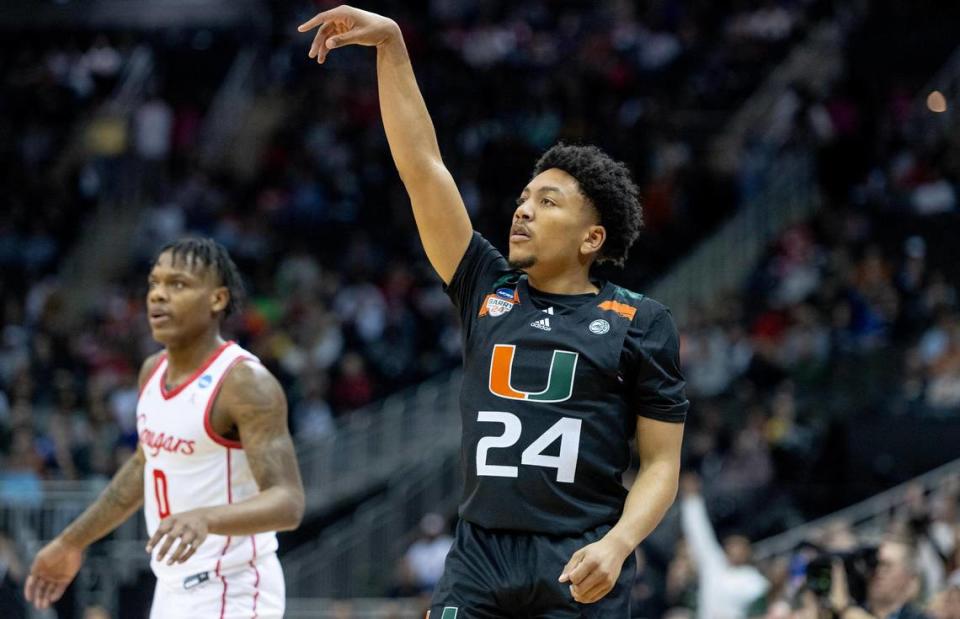Healthcare company led by top UM Hurricanes booster John Ruiz admits financial issues
Miami attorney John H. Ruiz has made a name for himself through the millions his companies have spent to help woo top athletes to the University of Miami through newly allowed sponsorship deals financially benefiting intercollegiate athletes.
In one eye-popping deal last year under the so-called Name, Image and Likeness program, known as NIL, one of his companies gave $800,000 and a car to Nijel Pack, a guard who transferred to Miami’s basketball team from Kansas State University.
Pack was paid to promote Ruiz’s healthcare litigation company, LifeWallet, which seeks to recover billions in improper healthcare payments.
As recent financial filings show, the company needs all the help it can get.
LifeWallet said at the end of March that it wouldn’t be able to file its annual report for 2022 on time. Last week, it indicated that it had discovered accounting errors, including “material weaknesses in internal controls,” that rendered two financial filings from last year unreliable. Monday, the company said that it had renegotiated two debts, pushing its repayment dates back by a year.

The company, originally named MSP Recovery Inc., was created by Ruiz in 2014. He had extensive success as a trial lawyer before starting the company, which uses proprietary software to identify instances in which insurers paid for services they shouldn’t have. The company then splits the proceeds with the insurers from whatever is recovered from the companies that should have paid in the first place.
The company said in a statement the accounting errors were based on “NON-CASH adjustments” and that the recent filings would not change its strategy or daily operations.
“We’d like to emphasize that these accounting matters do not affect the Company’s cash position, nor do they reflect any financial distress,” the company said. “LifeWallet continues to work diligently to file its Form 10-K and is committed to releasing its earnings report as soon as possible.”
The company added that it is “confident in its financial future” and stressed that a “substantial volume of cases” are outstanding and that the company’s recovery revenue depends on the pace of the judicial system.
The company also includes other divisions, which include one focused on making healthcare records more easily available to individual consumers and another that builds custom NIL marketplaces for colleges or other groups that are compliant with NCAA rules.
While college athletes had for decades been prevented from signing endorsement deals while a student, the NCAA allowed student athletes to begin signing such deals in the summer of 2021 and a majority of states now allow the practice.
The University of Miami didn’t respond to multiple requests for comment as to whether LifeWallet’s recent filings would change its relationship with Ruiz in any way.
Last year, LifeWallet went public by merging with a special purpose acquisition company, or SPAC, called Lionheart Acquisition Corporation II. The newly merged company was initially valued at $32.6 billion and listed on the NASDAQ stock exchange.
Ruiz, who is also the co-owner of the Cigarette Racing Team speedboat company, was, for the first time, listed on Forbes annual list of billionaires earlier this year, with an estimated net worth of $1.5 billion. He lives in a Coral Gables mansion that was the second most expensive home ever purchased in Miami-Dade County when Ruiz bought it for $49 million in 2020.
But almost immediately after the merger last year, the company’s stock price tumbled, losing 75% of its value in the week after it was first listed.
As the Washington Post previously reported, going public generated so little cash that the newly merged company didn’t have enough money to pay the bankers who structured the deal and Ruiz and a business partner were forced to lend the company $113 million.
The shortfall in cash was due largely to the fact that the vast majority of stockholders in Lionheart Acquisition Corporation II asked for their money back rather than accepting shares in the newly merged company.
Jay Ritter, a finance professor at the University of Florida’s business school, said that while this scenario isn’t uncommon in SPAC mergers, a lack of investor confidence sometimes leads companies to call off these kinds of deals.
“The fact that they went ahead with it anyway is a sign of desperation,” he said.
The company’s business performance has continued to lag since then.
As the Miami New Times previously reported, the company’s last financial report, through Sept. 30, 2022, showed that its revenue last year from health insurance recovery claims — the company’s main anticipated source of income — was only $21.79 million at that point, a far cry from the company’s initial projection of $992 million in recovery claims revenue for the entire year.
David Nelson, the former regional director for the Securities and Exchange Commission in Miami, said it’s too soon to say whether the company’s self-reported accounting errors will lead to any regulatory scrutiny or penalties down the road
“It’s very hard to tell until more stuff gets flushed out,” he said. “Certainly the SEC will take note of it and monitor it.”
The company indicated in its most recent filing that it has appointed a special committee to investigate the accounting errors and Nelson said that the SEC sometimes decides not to act further if a company conducts an internal investigation to identify and correct mistakes that appear credible.
“If it begins to look like it’s taking a turn for the worse, then the SEC can get more active,” Nelson said.

